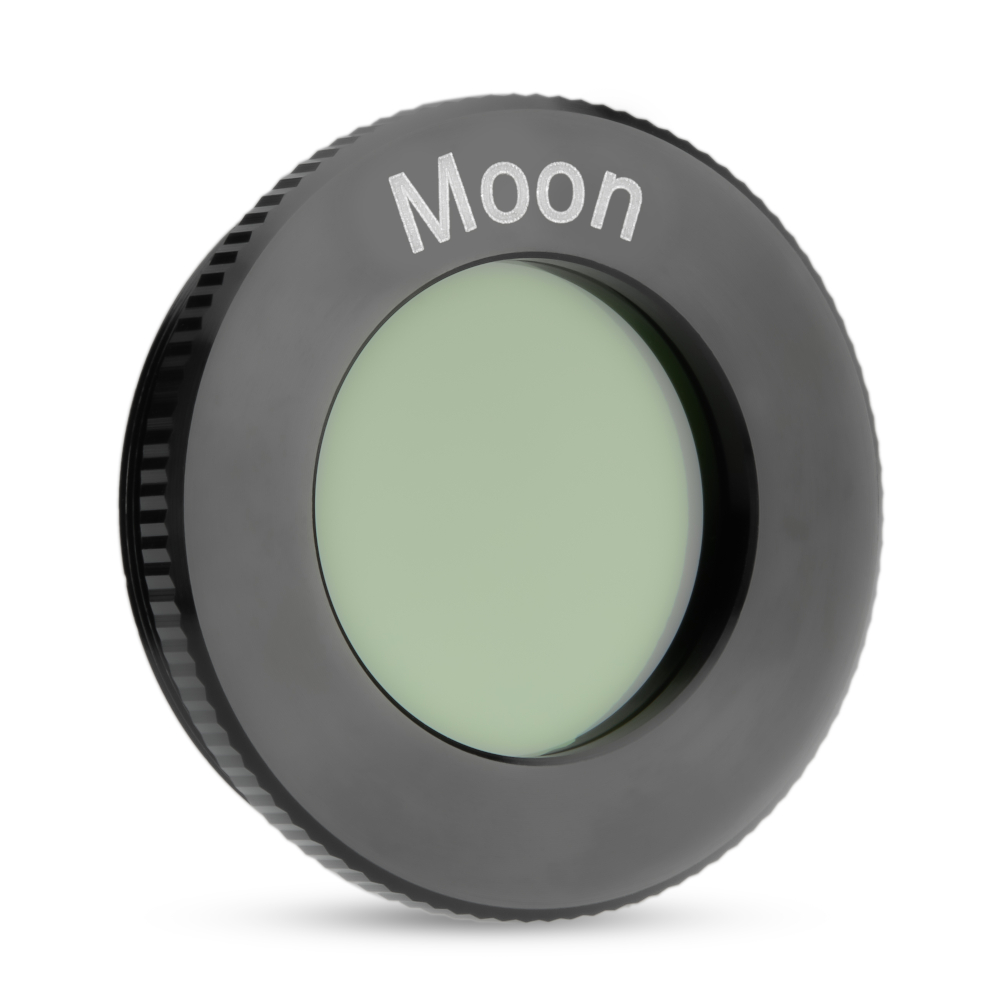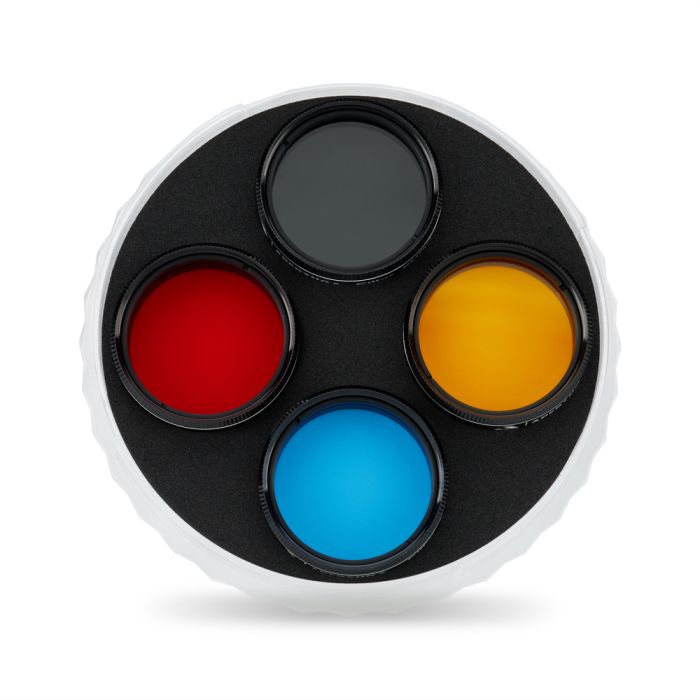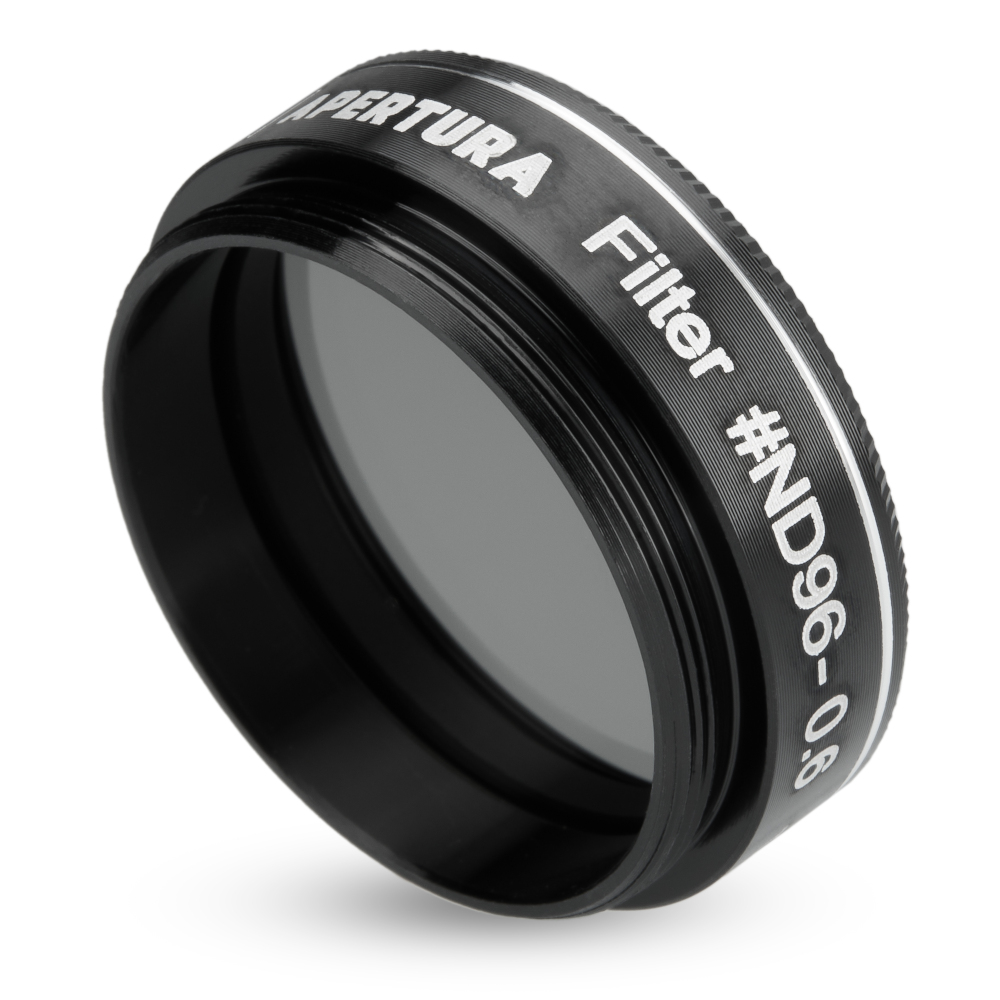
Apertura Filters increase contrast, reduce glare, and remove light pollution. Precision-crafted filters for astronomical viewing and imaging are perfect for planetary, deep-sky, and solar research. They enhance your astronomy toolset for the best results. This video contrasts glass versus film solar filters, emphasizing their implications on image quality, durability, and safety for safe sun observation.
Highlighted Products
Apertura 2" Variable Polarizing Filter
The high-quality Apertura Variable Polarizing Filter lowers the Moon's brightness, thus reducing glare and increasing comfort. This dynamic filter enables exact fine-tuning of light, improving the visual experience and enabling a more excellent perception of contrasting shadows and minute details over the lunar surface. This filter is needed to view full Moons, crescent slivers, craters, and lighted mountain ranges.
Apertura Ultra High Contrast 2" Filter
The Apertura UHC Filter is a highly beneficial filter that reduces light pollution and improves viewing experiences. This filter, known as "Ultra High Contrast," has narrower bandpasses than other filters, resulting in higher contrast views and a darker sky background. It effectively blocks artificial light from mercury vapor lamps, sodium vapor lights, and moon glow, leaving only the desired light.
Apertura #8 Light Yellow Filter - 1.25
With a Wratten number of #8, the Apertura #8 Light Yellow Filter, 1.25", offers 83% transmission and lowers glare, light scattering, contrast, definition, resolution, irradiation, and eye fatigue. Mounted in a black anodized aluminum cell, the filter consists of premium, anti-reflection-covered glass with a 26mm clear aperture. It may mostly be used with eyepieces.
Apertura 1.25" Moon Filter
The Apertura 1.25" Moon Filter helps reduce the Moon’s brightness, making it more comfortable to observe through a telescope. It improves contrast and detail by dimming glare, especially during full or near-full phases. The filter threads easily onto most 1.25" eyepieces and is ideal for casual and frequent lunar viewing. It’s a simple but effective tool for getting clearer, more enjoyable views of the Moon.
Apertura 2" UV/IR Astrophotography Filter
The Apertura 2" UV/IR Astrophotography Filter blocks ultraviolet and infrared wavelengths that can blur or distort images. It allows only visible light to pass through, helping achieve sharper, more accurate photos. This filter is especially useful when imaging with cameras that lack built-in UV/IR blocking. Its durable design fits standard 2" filter threads, making it easy to use with a variety of setups.
More About This Category
One of the primary reasons telescope filters are essential is to enhance contrast and visibility. The night sky, although mesmerizing, can present challenges regarding light pollution and atmospheric conditions. By strategically using filters, astronomers can mitigate the effects of light pollution, emphasizing the desired wavelengths and minimizing interference from artificial or natural light sources.
Celestial objects emit light in specific wavelengths or exhibit distinct features in certain colors. Telescope filters enable observers to isolate these characteristics, making it possible to study intricate details of planets, stars, galaxies, and nebulae more precisely. For instance, filters can highlight the delicate bands of Jupiter's atmosphere, reveal the ethereal glow of nebulae, or accentuate the subtle hues of distant galaxies.
Filters are essential for maximizing telescope observations because they selectively let some light wavelengths through while blocking others. Apertura filters are finely engineered to accentuate planetary surface characteristics, reduce moon brightness, and provide astronomers with various options to tailor their viewing plans.
What Exactly Can Filters Do?
- Telescope filters are a great way to observe planets in our solar system. Red filters, for instance, can improve the visibility of Martian surface characteristics, making it more straightforward to see specifics like dust storms and polar ice caps. Specialized filters can highlight a planet's distinctive features, giving astronomers more insight into the planets' surfaces and atmospheres.
- Filters that minimize glare and boost contrast benefit lunar viewing. By selectively reducing the Moon's brightness, filters such as the lunar filter enable observers to see more minute details on the lunar surface without being blinded by the brightness. This improves the clarity of exploring craters, mountain ranges, and other lunar features.
- Large gas and dust clouds called nebulae frequently release light in particular wavelength ranges. Nebulae include complex structures and intricacies that can be revealed using filters made specifically to block out specific wavelengths , turning an otherwise indistinct and diffuse object into a stunning work of cosmic art. The delicate features of emission nebula can be best shown with hydrogen-alpha filters.
- Specialized solar filters are needed for Sun observations to protect the observer and the telescope. Astronomers can examine solar characteristics like sunspots, prominences, and solar flares without risking eye damage or damaging the telescope's optics thanks to solar filters like hydrogen-alpha or white-light solar filters.
- Light pollution spreads artificial light into the atmosphere, making astronomical studies more difficult in urban or suburban environments. Astronomers can examine celestial objects against a darker background by using light pollution filters , such as broadband or narrowband filters, which can selectively exclude certain wavelengths linked to frequent sources of light pollution.
Why choose Apertura filters when several telescope filters are in the market?

All Apertura filters are meticulously crafted to cater to various needs. Highpoint carries the best Apertura filters, such as the 1.25" Lunar & Planetary Filter Set and the Apertura ND96-0.6 Neutral Density Filter - 1.25" , along with other filters for different purposes.

1.25" Lunar & Planetary Filter Set is intended for use with telescopes 8" and larger, revealing obscure planetary features. The contrast-enhancing 25 Red Filter is ideal for bringing details on Mars' surface, while the 58 Green filter is specifically designed to accentuate features like Jupiter's Great Red Spot.

On the other hand, Apertura ND96-0.6 Neutral Density Filter - 1.25 is a neutral density filter that reduces the amount of light that reaches your eyes so that you can see smaller, fainter details despite the brightness of the surrounding area. They do not affect the color of the moon or other objects. Put another way, viewing the Moon via an ND (neutral density) filter is like viewing the sun with sunglasses on!
Apertura filters are indispensable accessories for astronomers seeking to unlock the full potential of their observations. With a focus on precision craftsmanship, planetary optimization, versatility for different telescope sizes, and a commitment to affordability, Apertura has etched its name as a trusted provider of high-quality filters.




